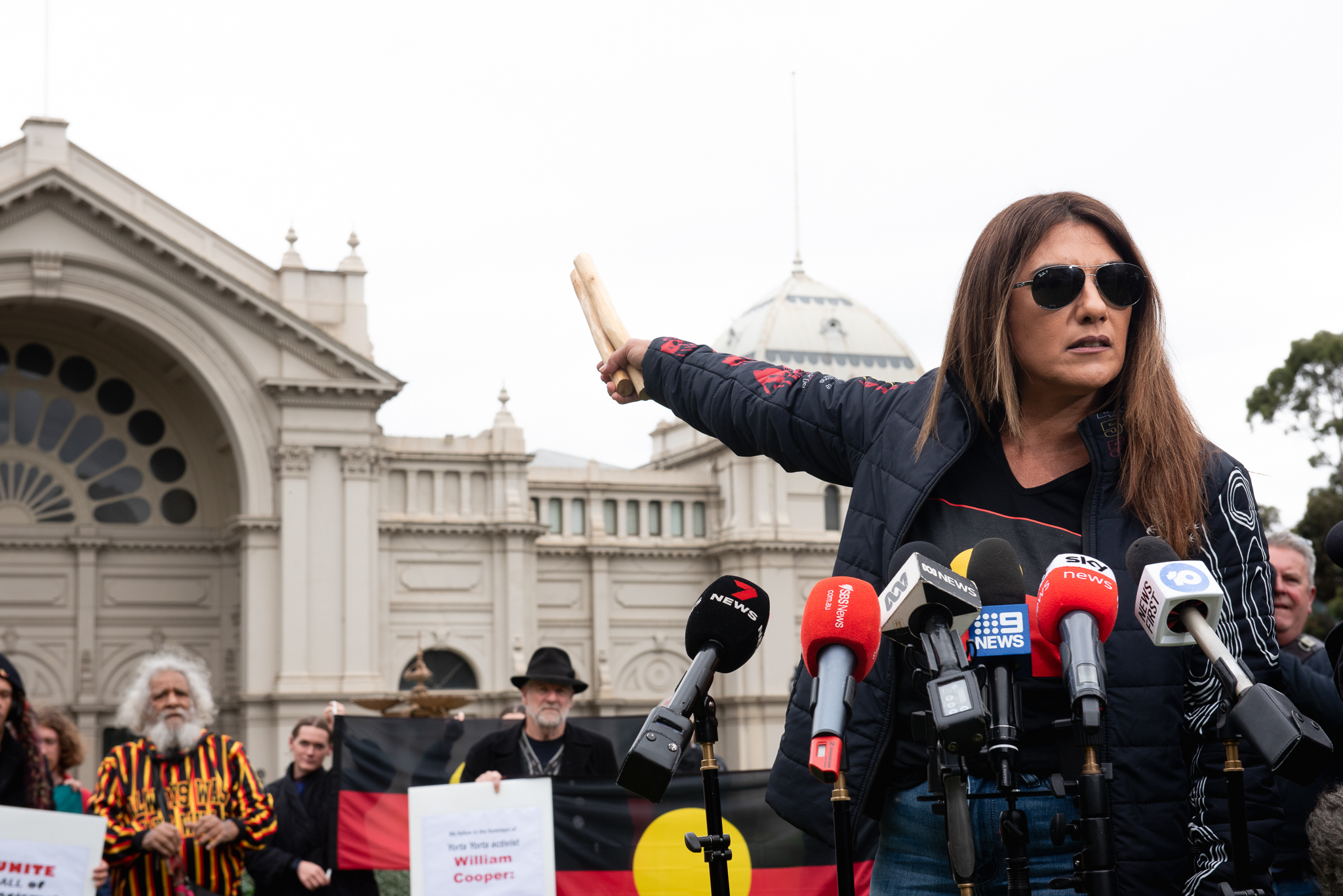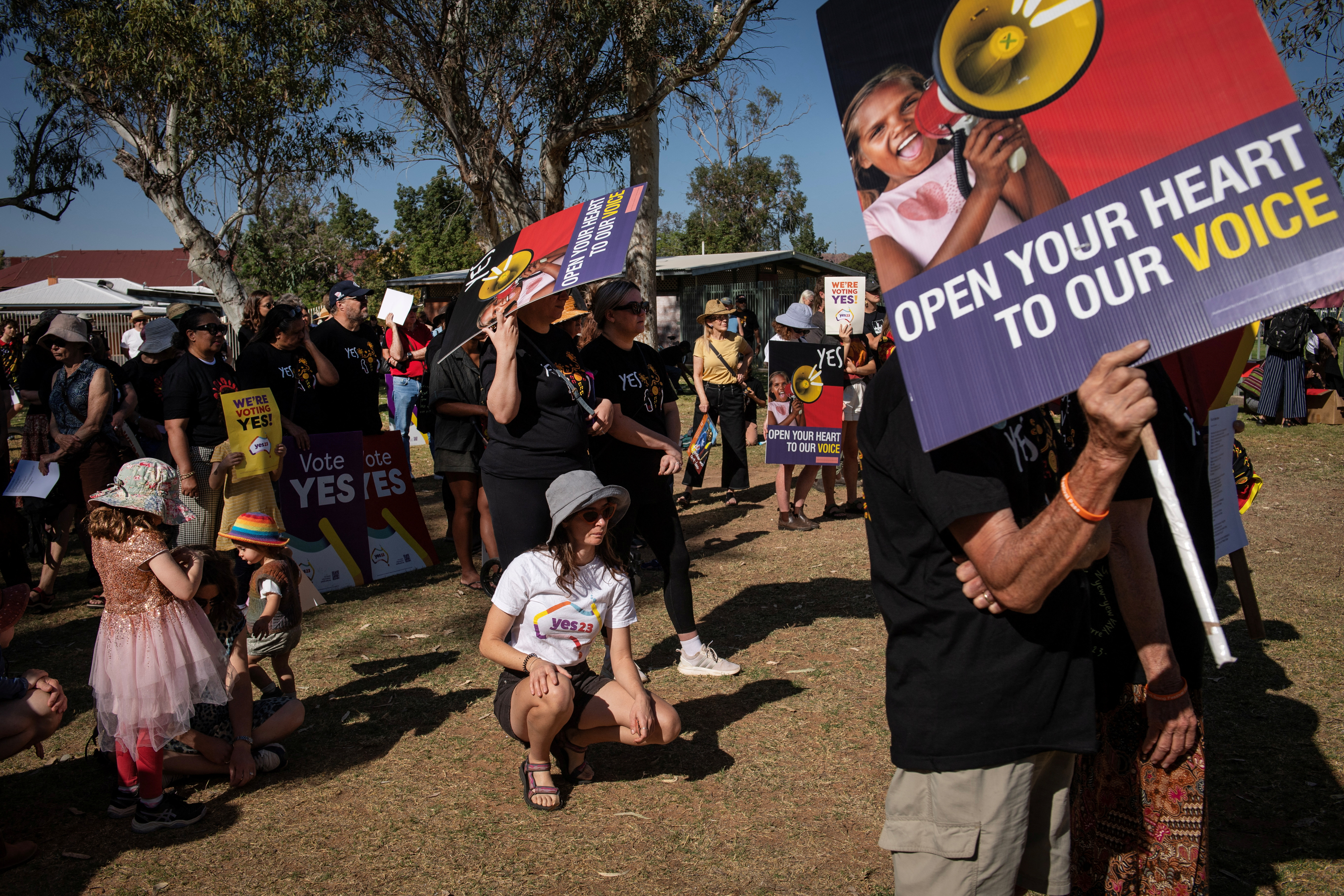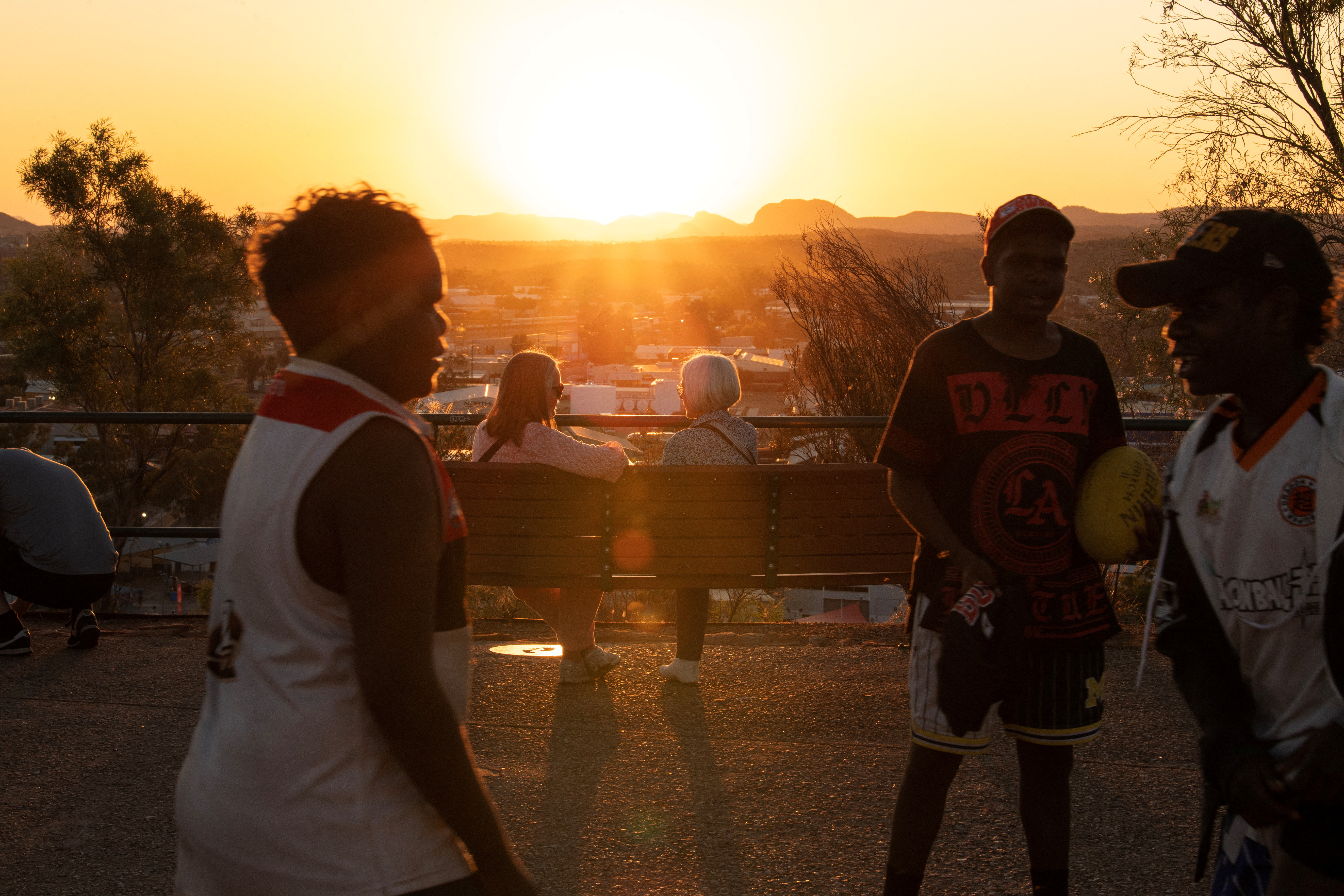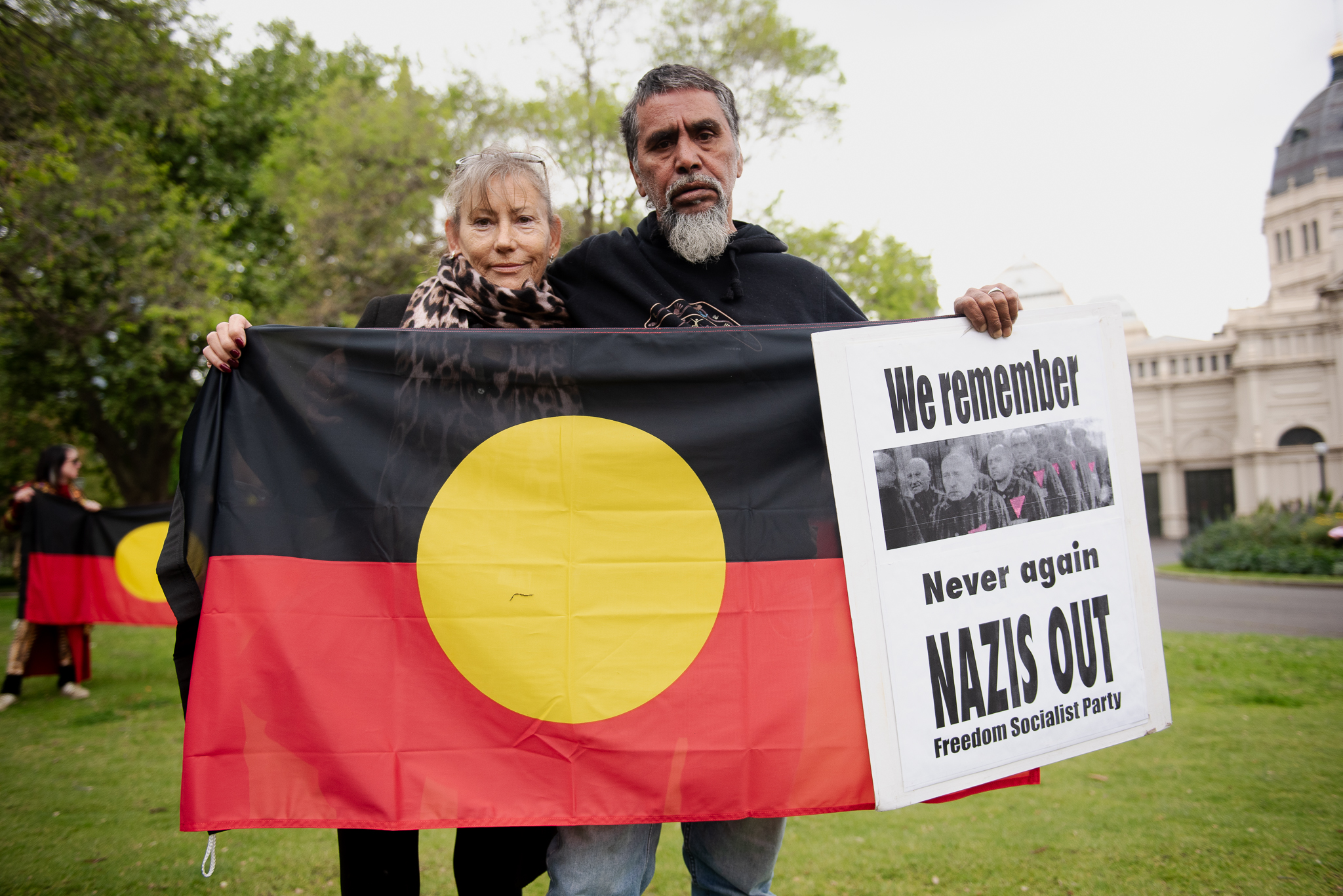
Melbourne, Australia – Days away from an historic referendum on Indigenous rights in Australia, the racism that has marred the campaign for weeks has intensified amid flagging public support for the proposed constitutional “Voice to Parliament”.
On Thursday, a video was released on social media showing a hooded man making a series of racist remarks against Indigenous peoples, before burning an Aboriginal flag and giving a Nazi salute.
The man, who was unidentified, also singled out Indigenous Independent Federal Senator Lidia Thorpe, who has been subject to a barrage of online racism and at times, death threats, since she entered the political arena in 2020.
The threats have got worse in the lead-up to the referendum, scheduled for October 14.
“People want to kill me out there. They don’t want my voice to be heard,” a visibly upset and angry Thorpe said at a press conference in response to the video. She railed against Prime Minister Anthony Albanese, accused the police of failing to protect her and challenged those who sent the video.
“I’m ready to fight for exactly what I went into parliament for and that is my country, my people. And I won’t stop. And I’m not scared. So come at me.”
Controversially, Thorpe – who identifies with the Djab Wurrung, Gunnai and Gunditjmara nations – is against the Voice, a Labor Party initiative which seeks to implement a constitutionally enshrined Indigenous advisory body in the federal government.

Instead, Thorpe advocates primarily for truth-telling and treaty as part of a Blak Sovereign Movement that would also demand that Indigenous deaths in custody be addressed as a priority.
‘Emboldening bigots and trolls’
The lack of support for the constitutional Voice to Parliament is a stark contrast to the hugely successful 1967 referendum on Indigenous rights.
At the height of the civil rights movement, 90.77 percent of Australians voted to count Indigenous people in the census and allow the federal government to make laws concerning Indigenous peoples.
But this year’s vote has largely split the nation, with the latest polls suggesting 43 percent will vote ‘yes’, and 49 percent ‘no’.
In Australia, a referendum asks voters to simply respond ‘yes’ or ‘no’ to a proposed constitutional amendment; a more than 50 percent ‘yes’ vote is required at a national level to make any change. Majorities are also required within each of the country’s six states. Voting is compulsory.
Since the initiative was announced last year, public debate has been marred by misinformation and racism, from hardliners in the ‘no’ campaign as well as the Liberals, Australia’s main opposition party, and its leader Peter Dutton. The Liberal Party, who were in government until 2022, are against the proposal.
In May this year, Indigenous Affairs Minister Linda Burney reprimanded Dutton in parliament for spreading “misinformation and scare campaigns” and accused Voice critics of being “hell-bent on stoking division”.
Dutton’s campaign in misinformation even prompted Voice architects The Uluru Statement to include a fact-checker, titled Seven Peter Dutton Lies on the Voice to Parliament Corrected, on their webpage.
While Dutton has publicly condemned the Nazi video, Rueben Berg, co-chair of the First Peoples Assembly, an Indigenous advisory group in the state of Victoria, told Al Jazeera the campaign waged by the opposition leader was “emboldening the bigots and trolls”.
“Since Peter Dutton announced that his party would campaign for a ‘no’ vote, we’ve seen a dramatic rise in racist abuse and hatred directed at First Peoples, both online and in everyday life,” he said.
“Our Assembly Facebook page went from getting a handful of racist comments a week to our staff having to report and block hundreds of people every week.”
Berg, from the Gunditjmara nation, also said that while the First Peoples Assembly had approached Meta, which controls the Facebook platform, to amend their online community safety standards, little had been done to alleviate the racism Indigenous peoples were subjected to.
“If someone at a forum got up and started hurling racist abuse at me, they’d been shown the door. But on Facebook, they can just spew horrific racism at us all day, every day,” he told Al Jazeera.
“We know that the vast majority of Aboriginal people want the Voice to Parliament and want to be supporting the ‘yes’ vote, but it’s just really hard going when they get online to have a say and get screamed out by swarms of aggressive and persistent racists.”
Claims of racism have been flung by opponents on both sides of the debate. Along with the “swarms of aggressive and persistent racists” online, Indigenous leaders have also entered the fracas.
In late August, leading Indigenous ‘no’ campaigner Warren Mundine accused Prime Minster Albanese of instigating “horrible racial abuse” against people who do not support the Voice, leading him to “almost to suicidal positions”.
Mundine was reported in Australian media saying the prime minister had “opened up the floor” for the division and abuse.
Meanwhile, prominent Voice supporter and Indigenous spokesperson and academic Marcia Langton also found herself at the centre of the debate over racism after she said that claims made by the ‘no’ campaign were “based on racism and stupidity”.
Toll on mental health
The heightened racial debate has led to a spike in Indigenous people seeking mental health support.
Marjorie Anderson, the national manager from the Indigenous-run mental health hotline 13YARN, told Al Jazeera that the organisation had seen a 108 percent increase in callers reporting abuse, racism and trauma compared with the same period in 2022.
“Overall, call numbers have also increased, with three of 13YARN’s top 10 busiest weeks having occurred over the last five weeks,” Anderson said.
This latest spike in reported racism and poor mental health exacerbates an already existing concern for Indigenous peoples in Australia.
Colonised by the British in 1788, Indigenous peoples from more than 300 diverse nations were initially subject to genocidal massacres and forced land clearances, before punitive assimilation policies were enacted in the 20th century.
Known as the Stolen Generations, these policies saw Indigenous children removed from their families and cultural practices to be re-educated with British ideals, often in abusive institutions.
Such policies – which only ended in the 1970s – have led to what Indigenous experts, such as the Healing Foundation, define as intergenerational trauma, leading to poor mental health outcomes exacerbated by daily experiences of racism and underscored by ongoing social inequalities.

In 2022, the Australian Institute of Health and Welfare reported that 42 percent of Indigenous adults surveyed experienced racial discrimination on a daily basis, while more than 30 percent experienced high levels of psychological distress, more than twice the rate of non-Indigenous Australians.
Such impacts on health and wellbeing also mean that suicide rates for Indigenous peoples sit well above the national average.
In 2020, suicide was the fifth leading cause of death among Indigenous Australians, making up 5.5 percent of all deaths, compared with 1.9 percent for the overall Australian population.
Suicide was the leading cause of death for Indigenous children aged 5-17 in that same year.
The Black Dog Institute – an Australian-wide mental health support organisation which also assists Indigenous peoples – noted the parallel in mental health impacts to the 2017 plebiscite on same-sex marriage, which exacerbated homophobic abuse.
The organisation says Indigenous mental health advocates had warned the government that the debate on the Voice referendum had the potential to badly affect Indigenous peoples.
“We know the tonality of the debate has a significant effect on mental health impacts. The more divisive the debate, the greater the impact; the more respectful and inclusive, the lesser the impact,” said Clinton Schultz, Director of First Nations Partnership and Strategy at the organisation.
Schultz, from the Gamilaroi and Gomeroi nations, added that his organisation was “already seeing firsthand the negative impacts of the debate in our communities, in terms of increased psychological distress, increased need for support and increased use of mental health services”.
Earlier this year, the government set aside an additional 10 million Australian dollars ($6.37m) to fund mental health support for Indigenous peoples during the referendum campaign.
Stark inequalities
The proposed Voice to Parliament is the latest initiative attempting to address the inequalities and discrimination experienced by Indigenous peoples in Australia.
Despite the positive intention of the referendum itself, Australian Race Discrimination Commissioner Chin Tan said that the nature of the debate surrounding the vote had only exacerbated the problems for Indigenous people.
Tan said he was “disappointed that the way some people have engaged in the debate has stoked racial tensions and caused harm to First Nations peoples.”
Noting that the Voice was a “necessary measure to overcome the inequality, discrimination and structural racism experienced by First Nations people” by involving them in the decisions that affect them, he added that he was disappointed at the way campaigning had been conducted.
“I’m concerned that the racism that has occurred has been largely unchallenged in the public sphere,” he told Al Jazeera. “Racism should never be accepted as part of the exchange of ideas in public debate. More than ever, this demonstrates we have a lot to learn as a community about the nature of racism and the harms it causes.”

Police are now investigating the Nazi video, while Albanese has condemned the statements and actions of the perpetrator.
“I’ve seen the video that is referred to that is threatening towards Senator Thorpe and towards the government,” he said.
“The sort of Nazi rhetoric and comments that are in that video have no place in discourse in Australian political life.”
After the video was released, Lidia Thorpe went to stay with family member Ringo Terrick, while police officers kept watch outside the house.
Terrick, from the Wurundjeri Woiwurrung nation, attended Thursday’s press conference with Thorpe.
He told Al Jazeera that while the politician was “a very strong woman”, she was “in a state of fear from the extremist threats to cause her harm in the midst of this referendum conversation that’s going on in the country.”
“The referendum has caused a great deal of angst and anxiety for lots of [Indigenous] people,” he said.







